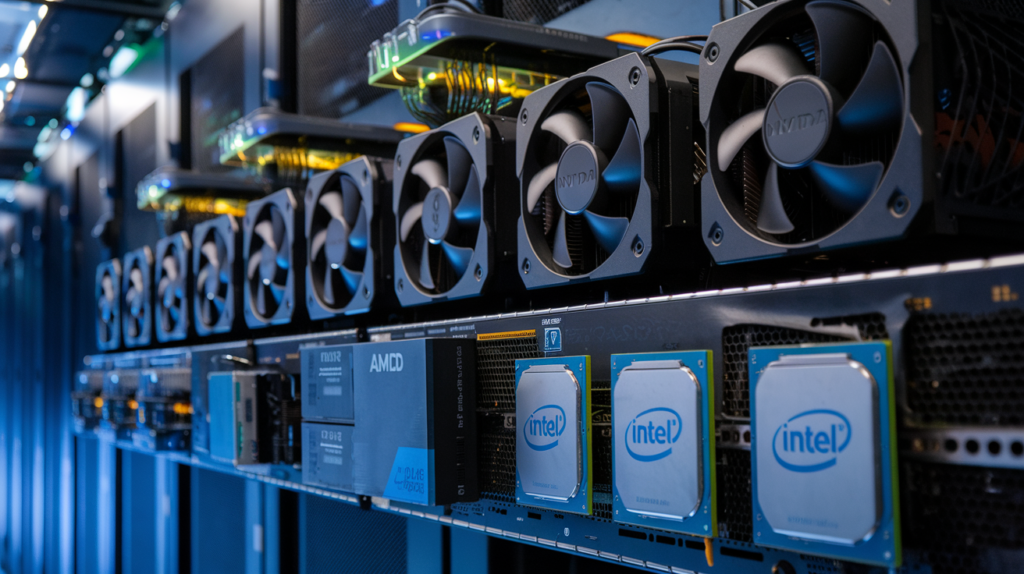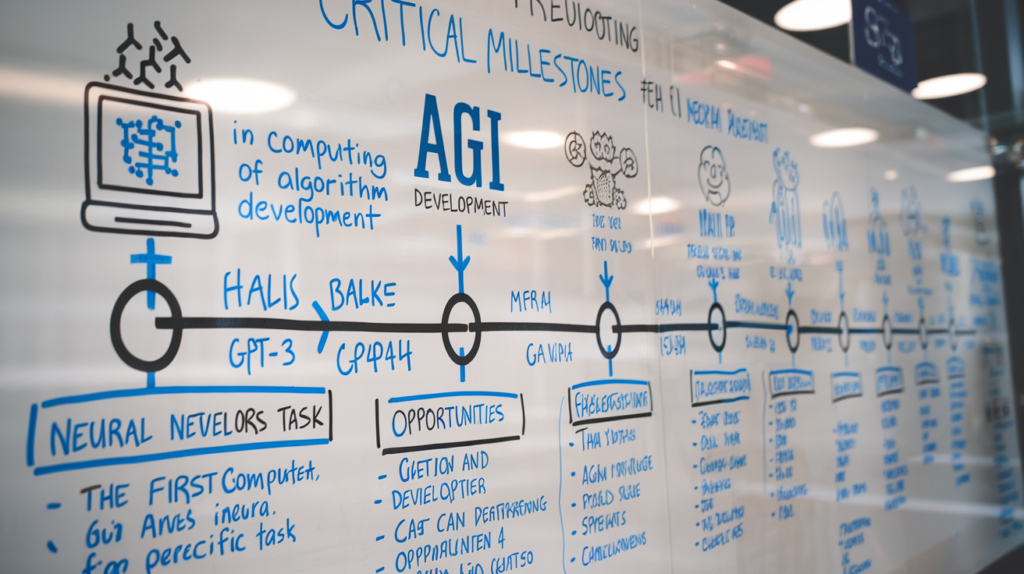Artificial General Intelligence (AGI) has long been viewed as the ultimate frontier in the realm of artificial intelligence. While current AI systems are designed for narrow tasks—known as Narrow AI—Artificial General Intelligence aims to achieve human-like cognition and versatility. AGI aspires to understand, learn, and apply knowledge across a wide array of subjects as effectively as a human can.
The vision for Artificial General Intelligence is to create machines that can reason, solve complex problems, and adapt to new situations with minimal human intervention. Recent advances in supercomputing and neural network technologies have significantly accelerated the development of AGI. For instance, projects like SingularityNET’s OpenCog Hyperon are pushing the boundaries of what AGI can achieve. In this article, we will explore AGI, the role of supercomputing in its development, its potential societal impacts, and the substantial challenges that remain.
What is Artificial General Intelligence?
Artificial General Intelligence represents a significant leap from the Narrow AI systems that currently dominate the technological landscape. While Narrow AI specializes in specific tasks such as language translation or autonomous driving, AGI focuses on modeling general cognitive abilities similar to human intelligence.
Key Features of Artificial General Intelligence
- Flexibility: Artificial General Intelligence would handle a broad range of tasks requiring human-like intelligence. It would understand and address problems beyond the specialized fields of current AI systems.
- Abstract Reasoning: AGI systems would solve abstract reasoning problems across various domains. They would generalize knowledge from one area and apply it to another, reflecting traits characteristic of human intelligence.
- Learning and Adaptation: One defining feature of Artificial General Intelligence is its ability to learn from experience and adapt its behavior accordingly. This implies that AGI could make decisions based on limited or incomplete information and tackle complex situations independently.
- Autonomous Decision-Making: AGI systems would make autonomous decisions and devise novel solutions for complex problems without constant human input.

The Role of Supercomputing in AGI Development
Supercomputing plays a pivotal role in developing Artificial General Intelligence due to its high computational demands. Training AGI models involves processing vast amounts of data and performing complex calculations that conventional computers cannot handle effectively.
Supercomputing Innovations
- Modularity in Supercomputing Networks: Companies like SingularityNET are developing modular supercomputing networks specifically designed for AGI architectures. These networks integrate various computational models, including deep neural networks and multimodal systems.
- Deep Neural Networks: Deep neural networks, inspired by the brain, are critical to AGI research. Training these networks requires large datasets and substantial computational resources.
- Large Language Models: Models like GPT-4 are essential for advancing AGI. These models, trained on diverse data, help AGI systems understand and generate human-like text. To handle a broader range of cognitive tasks, researchers must significantly scale these models.
- Multimodal Systems: Artificial General Intelligence systems will integrate various forms of input, such as text, speech, and visual data. Multimodal systems combine these data types to enhance machine understanding and decision-making.
The first SingularityNET supercomputing node will commence operations this month, and the full network is expected to be operational by 2025. This infrastructure will play a crucial role in developing AGI systems capable of independent reasoning, learning, and adaptation.

Why Supercomputing is Essential for AGI
Designing Artificial General Intelligence demands immense computational power. Training AGI models involves processing and analyzing large datasets and performing complex computations. Here’s why supercomputing is essential:
- Data Processing Capacity: AGI systems will require processing enormous amounts of data. Supercomputers provide the computational power necessary for this extensive data handling.
- High-Performance Hardware: Training AGI models requires advanced hardware, such as GPUs and TPUs. These processors meet the high demands of machine learning algorithms crucial for AGI research.
- Federated Computing Clusters: Researchers use federated computing clusters to pool resources from various sources, enhancing processing power and addressing complex computational challenges.
- Scalability: As AGI models advance, their computational needs will grow. Supercomputing networks are designed to scale, meeting the increasing demands of AGI research.
Companies like Nvidia and AMD are leading the development of high-performance processors for AGI. Their innovations are crucial in providing the computational resources necessary for progress in this field.

The Impact of AGI on Society
Artificial General Intelligence is poised to reshape many aspects of human life. Here are some potential impacts:
Healthcare
- Precision Medicine: AGI could transform personalized medicine by enabling precise forecasts and treatments for complex diseases. AI platforms already excel at selecting personalized medication dosages based on individual patient data.
- Disease Diagnosis: AGI could improve diagnostic systems by analyzing data from various sources, allowing for early disease detection and recommending optimal treatment plans.
Human Resources
- Job Automation: AGI’s advanced reasoning and decision-making capabilities could automate many cognitive jobs, leading to job displacement. However, this could also create new opportunities in AI development, data science, and ethics.
- New Jobs Created: As AGI technologies advance, new roles will emerge in managing, refining, and providing ethical oversight for these systems.
- Education:
- Personalized Learning: AGI could revolutionize education through tailored tutoring systems that adapt to each student’s learning style. These systems would offer real-time feedback and enhance critical thinking skills.
- Accessible Education: AGI could provide high-quality education to students worldwide, closing educational gaps and overcoming geographical barriers.
Climate Change
- Advanced Modeling: AGI’s advanced modeling capabilities could help combat climate change by analyzing complex global data and proposing strategies for carbon reduction, energy efficiency, and sustainable living.
- Innovative Solutions: AGI could drive innovation in environmental technologies, offering new approaches for sustainable energy, waste management, and conservation.

Social and Ethical Implications of AGI
The development of Artificial General Intelligence introduces several social and ethical concerns that must be addressed to ensure its benefits outweigh the risks:
Control and Governance
- Ensuring Alignment: One major concern is ensuring that AGI aligns with human values and ethical standards. Researchers and policymakers must collaborate to create frameworks for the responsible development and use of AGI.
- Regulatory Frameworks: Effective regulations for AGI research and deployment are crucial. These regulations should focus on safety, transparency, and accountability.
Data Privacy:
- Privacy of Personal Information: AGI systems will handle significant amounts of personal data, which must be protected. Ensuring robust data security is essential.
- Data Management Policies: Implementing strong data protection policies will help maintain public trust and safeguard personal information.
- Job Loss:
- Reskilling the Workforce: The automation potential of AGI could lead to job displacement. Preparing the workforce for new roles through reskilling initiatives is necessary.
- Transition Support: Workers should receive support to transition to new jobs, including retraining programs to acquire new skills.
Security Threats
- Cyber Threats: AGI systems could be vulnerable to cyberattacks. Ensuring their security and preventing misuse is critical.
- Ethics and Safety: AGI must be safeguarded against harmful uses, such as warfare or surveillance. Establishing ethical guidelines and oversight mechanisms will help mitigate these risks.
The development of AGI introduces new ethical dilemmas related to governance, security, and data privacy.
What AGI Has in Store for the Future
The path to Artificial General Intelligence will be marked by ongoing research and significant milestones. Here’s what to expect in the coming years:
Technological Milestones
- Breakthrough Innovations: Advances in supercomputing, neural network architectures, and machine learning algorithms will drive progress toward AGI. Overcoming current limitations will be key to achieving AGI capabilities.
- Collaborative Efforts: Platforms like OpenCog Hyperon facilitate global collaboration in AGI research, allowing researchers to test and share different architectures.
- Ethical and Regulatory Developments:
- Frameworks and Guidelines: Developing ethical and regulatory frameworks will be crucial as AGI research advances. These frameworks will guide the responsible development and deployment of AGI technologies.
- Public Discourse: Public discussions about AGI’s implications will help shape policies and ensure that societal concerns are addressed. Engaging diverse stakeholders will enhance transparency and accountability.
Business and Institutional Efforts
- Research Centers: Academic and research institutions will continue to play a vital role in AGI development. Their contributions to fundamental research and experimentation will drive innovation.
- Industry Investments: Private companies and startups will invest heavily in AGI research and development, accelerating progress and bringing AGI technologies closer to reality.
General Adoption and Assimilation
- Real-World Applications: As AGI technologies mature, they could lead to innovations in healthcare, education, and environmental solutions. Real-world applications will showcase AGI’s potential benefits.
- Public Acceptance: Gaining public acceptance will be crucial for AGI’s integration into society. Addressing concerns and highlighting benefits will build trust and support.

Conclusion: Are We Ready for AGI?
The journey toward Artificial General Intelligence represents a major technological ambition and excitement. As we approach AGI, focusing on its ethical and social dimensions is crucial. The opportunities are vast, but so are the risks. A collective effort from researchers, policymakers, and the public is needed to navigate this new frontier responsibly.
The development of AGI is not only a technical challenge but also an opportunity to shape the future of human-machine interaction. Addressing the ethical and social challenges will be essential for ensuring that AGI serves as a positive force for humanity, driving innovation and improving quality of life.
- Revolutionizing Medical Imaging: How AI’s ScribblePrompt is Transforming Diagnostic Accuracy - September 16, 2024
- Unlocking AGI: How Supercomputing is Paving the Way for Human-Level AI - September 11, 2024
- How AI is Transforming the iPhone 16: A Deep Dive into Its Revolutionary Features - September 10, 2024

